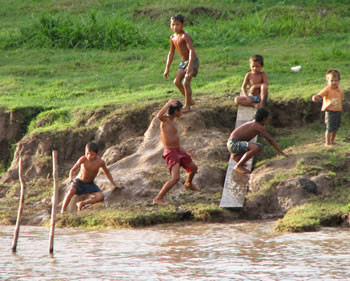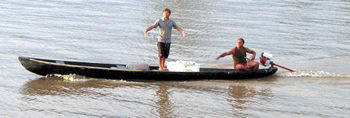River Banks
For hour after hour, we sail upstream and pass settlements — some a scattering of houses, others with paved streets and courthouses and power stations — that literally face the river. People coming and people going, but everyone comes and goes by river. Parintins, too, with 50 or 100,000 people, sits on an island; when the town fills up with visitors for the Boi-Bumbá festival, everyone comes and goes by boat.
Still, as we passed upstream lots of people stopped to watch us.

The great conflict in the Amazon is simply that it's home to a lot of people, and it's also a vast bank of resources that the whole planet needs. The forest is fragile — ironically, the soil of the Amazon is often shallow and easily eroded; take away a few trees and what's left is sand. But it's home, and people need groceries.
It's going to be a terrible mess in the coming years, but in the mean time you can have fun with a few friends and a smooth plank. The kids are growing up inside the planetary bank. Someday, we're going to need to settle up.

It's not just a bank, it's a market, too. From time to time, we'd heave to and pick up some just-caught fish, or some blocks of cheese from a riverfront farm. Again, split loyalties: should ecotourists be eating cheese from ranches in the Amazon, when it's probably not a good idea to encourage chopping down good rainforest to make bad pasture? But then again, it's better to support local people, surely, than to cart in food from far away and visit in a hermetic bubble.
The fish, especially, were terrific.